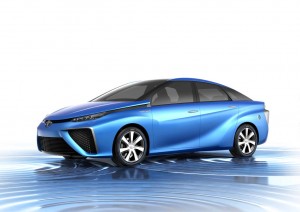Toyota is the latest automaker this week to jump headlong into the hydrogen fuel cell-powered vehicle market with its plan to begin selling its FCV in Japan in 2015 with the United States and Europe to follow.
The Japanese maker’s announcement follows similar proclamations from Honda and Hyundai, which pledged to offer fuel cell vehicles in a similar time frame. Toyota has been tinkering with hydrogen power since 1992 but this time, “I think it’s the real deal,” said Jim Lentz, Toyota’s top U.S. executive.
“I think this is a real solution because consumers want clean vehicles that act like today’s cars, and this is as close as you get.”
Unlike some of the concepts that have been shown in the past, the FCV looks street ready and is reminiscent of the Prius in terms of its exterior. Often the biggest hurdle that automakers face when introducing a vehicle utilizing cutting-edge technology is pricing.
Toyota is promising the price for the FCV will be between $50,000 and $100,000 with the lower end of the range being the target. However, it didn’t take long for a pricing war to break out.
Korean rival Hyundai Motor Co. will start leasing a Tucson SUV powered by a hydrogen fuel cell next year with a $499-a-month lease that will include the cost of fueling up the alternative vehicle.
The launch of the Hyundai Tucson Fuel Cell Vehicle will come about a year ahead of when both Toyota and Honda have said they will put their own hydrogen cars into production. Other manufacturers, including General Motors, have suggested they could also launch their own fuel-cell vehicles later in the decade.
(Hyundai to begin leasing fuel cell-powered Tucson next year. For more, Click Here.)
Fuel cell vehicles have been around for some time – Honda’s been leasing one in California since 2005 – but they have been plagued by several issues: a lack of infrastructure for fueling them and the size of the cells to start.
(Click Here to see Honda’s plans for fuel cell vehicles.)
However, there have been some big changes in what has motivated the push for hydrogen power: When the first push came, a decade ago, everyone thought the planet’s supply of oil would begin to run out by 2020 or so. Those fears have subsided, but there is still a clear sense that “we have to move away from petroleum,” Lentz said, adding, “It’s a little bit of a chicken-and-egg (problem) with the infrastructure.”


I don’t think they could make more ugly looking models if they tried… WTF are they thinking?